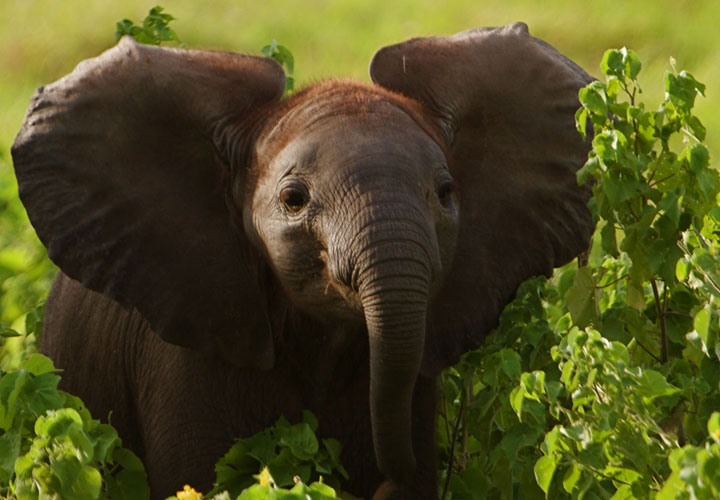Why Botswana has lifted its ban on elephant hunting
Government acts to reduce elephant numbers but former president criticises move

A free daily email with the biggest news stories of the day – and the best features from TheWeek.com
You are now subscribed
Your newsletter sign-up was successful
Botswana, home to the world’s largest elephant population, is to lift a 2014 ban on the hunting of the animal.
This week, the southern African country’s Ministry of Environment, Natural Resources Conservation and Tourism said that “predators appear to have increased and were causing a lot of damage as they kill livestock in large numbers”. The country would ensure that the “reinstatement of hunting is done in an orderly and ethical manner”, according to Bloomberg News.
Botswana is home to around 160,000 elephants - more than any other country in the world and three times as many as in 1991, according to Bloomberg.
The Week
Escape your echo chamber. Get the facts behind the news, plus analysis from multiple perspectives.

Sign up for The Week's Free Newsletters
From our morning news briefing to a weekly Good News Newsletter, get the best of The Week delivered directly to your inbox.
From our morning news briefing to a weekly Good News Newsletter, get the best of The Week delivered directly to your inbox.
As its natural habitat shrinks as a result of human activity, the African elephant - which is classified as vulnerable on the International Union for Conservation of Nature’s (IUCN) Red List - is “increasingly coming into contact with humans”, says CNN.
That has led to elephants raiding crops, killing livestock, destroying water supplies - and sometimes even injuring and killing people, according to the IUCN.
Botswana’s president, Mokgweetsi Masisi, set up a committee in June last year to consider repealing the hunting ban, Reuters reports. At the time, the committee chair said it recommended “a legal framework that will enable the growth of a safari hunting industry and manage the country’s elephant population within the historic range”. The committee also called for “regular but limited” elephant culling.
Former president Ian Khama, who brought in the ban in 2014, is among those who have criticised the repeal efforts. He says the move is designed to earn votes from the country’s rural regions and could have an adverse affect on tourism, which accounts for a fifth of the economy, second only to diamond mining.
A free daily email with the biggest news stories of the day – and the best features from TheWeek.com
But the Botswana Wildlife Producers Association voiced support for the move. “Conservation of our species is paramount, but communities’ rights and livelihoods are as important as the species itself,” spokeswoman Debbie Peak said in a text message to Bloomberg News.
Dani Rabaiotti, an environmental scientist based at the Zoological Society of London, agreed, saying: “Who are we to tell the people who live alongside these animals that eat people’s crops, injure and even kill people, how to manage their elephants?”
The majority of Botswana’s elephants live in the northeast of the country. Despite the ban on hunting, “one of the worst elephant slaughters in recent years” took place here, says US news site The Hill.
The tusks of 87 elephants were found during a period in 2018 while a charity, Elephants Without Borders, conducted aerial surveys of the region. The Botswanan government called the findings “false and misleading”.
While elephant numbers have increased in some areas, the population of elephants across Africa has fallen over the past decade by about 111,000 to 415,000. This is due largely to poaching for ivory, according to the IUCN.
-
 Bonfire of the Murdochs: an ‘utterly gripping’ book
Bonfire of the Murdochs: an ‘utterly gripping’ bookThe Week Recommends Gabriel Sherman examines Rupert Murdoch’s ‘war of succession’ over his media empire
-
 Gwen John: Strange Beauties – a ‘superb’ retrospective
Gwen John: Strange Beauties – a ‘superb’ retrospectiveThe Week Recommends ‘Daunting’ show at the National Museum Cardiff plunges viewers into the Welsh artist’s ‘spiritual, austere existence’
-
 Should the EU and UK join Trump’s board of peace?
Should the EU and UK join Trump’s board of peace?Today's Big Question After rushing to praise the initiative European leaders are now alarmed
-
 Epstein files topple law CEO, roil UK government
Epstein files topple law CEO, roil UK governmentSpeed Read Peter Mandelson, Britain’s former ambassador to the US, is caught up in the scandal
-
 Iran and US prepare to meet after skirmishes
Iran and US prepare to meet after skirmishesSpeed Read The incident comes amid heightened tensions in the Middle East
-
 Israel retrieves final hostage’s body from Gaza
Israel retrieves final hostage’s body from GazaSpeed Read The 24-year-old police officer was killed during the initial Hamas attack
-
 China’s Xi targets top general in growing purge
China’s Xi targets top general in growing purgeSpeed Read Zhang Youxia is being investigated over ‘grave violations’ of the law
-
 Panama and Canada are negotiating over a crucial copper mine
Panama and Canada are negotiating over a crucial copper mineIn the Spotlight Panama is set to make a final decision on the mine this summer
-
 Why Greenland’s natural resources are nearly impossible to mine
Why Greenland’s natural resources are nearly impossible to mineThe Explainer The country’s natural landscape makes the task extremely difficult
-
 Iran cuts internet as protests escalate
Iran cuts internet as protests escalateSpeed Reada Government buildings across the country have been set on fire
-
 US nabs ‘shadow’ tanker claimed by Russia
US nabs ‘shadow’ tanker claimed by RussiaSpeed Read The ship was one of two vessels seized by the US military